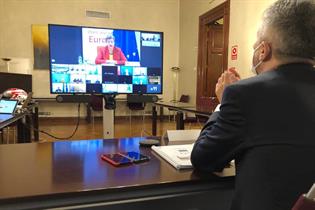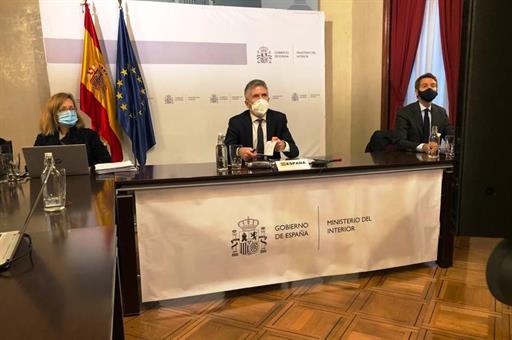"Illegal immigration is a structural challenge to the EU as a whole", says Fernando Grande-Marlaska
News - 2020.12.14
The minister, at the meeting of the Justice and Home Affairs Council of the European Union, held by video-conference, highlighted in this regard that "the first step to achieving a common position" consists of accepting that illegal immigration is a "structural challenge for the EU as a whole".
Fernando Grande-Marlaska began his speech by thanking both the German Rotating Presidency of the Council of the EU and the European Commission for their "hard work" in these almost three months since the presentation of the Pact on Migration and Asylum but stressed the need to continue making progress.
"We cannot make progress on negotiations if we cannot overcome a binary focus under which some take on the unconditional responsibility of managing illegal immigration while others offer potential support according to their circumstances and possibilities", he claimed.
The Minister for Home Affairs also underlined the need to adequately provide the Pact on Migration and Asylum with an external dimension. "We must continue developing this aspect, multiplying the cooperation mechanism with the countries of origin and transit, and working on tasks that improve collaboration with them", he explained.
On this point, Fernando Grande-Marlaska thanked the Commissioner for Home Affairs of the European Union, Ylva Johansson, "for her focus on European migratory policy, based on the commitment to and construction of relations with countries of origin and transit, as shown by her trips to Morocco, Tunisia and Mauritania".
"I think we are moving down the right path, which is none other than committing to the external dimension and the prevention of primary movements", said the minister.
As regards return policies for migrants that are not granted international protection to their countries of origin, another of the issues addressed at the Justice and Home Affairs Council, Fernando Grande-Marlaska indicated that readmission is the result and the consequence of a medium- and long-term migratory policy based on the construction of shared agendas, on the identification of common interests and mutual trust. He quoted, by way of example, the experience of the Government of Spain with such countries as Morocco, Algeria, Mauritania and Senegal.
Exchange of information
 The EU home affairs ministers also addressed stepping up the exchange of police information between Member States in the field of security. "It is essential for police officers to have all the necessary information available to perform their functions, including when provided by another Member State", said Fernando Grande-Marlaska.
The EU home affairs ministers also addressed stepping up the exchange of police information between Member States in the field of security. "It is essential for police officers to have all the necessary information available to perform their functions, including when provided by another Member State", said Fernando Grande-Marlaska.
The minister stated that in this process "it is key in strengthening all types of capacities and resources of Europol, in support of the needs of Member States". He also underlined the need to strengthen cross-border police cooperation and cooperation with third countries, "because there is also a close tie between internal and external dimensions on the issue of security".
As regards the fight against terrorism, Fernando Grande-Marlaska highlighted the need to continue strengthening the fight against radicalisation. The minister referred in this regard to the importance of victims of terrorism due to "the value of their discourse in the prevention of radicalisation".
The JHA Council also addressed the dimension of online terrorism. In this regard, the Council served to address the proposed Regulation on the prevention of the dissemination of terrorist content online, which is mainly focused on the proactive action of Member States in identification and communication to storage service providers and the subsequent blocking of access or removal by the latter.
The Spanish minister indicated that Spain has also updated the National Counter-terrorism Strategy "to adapt it to the new challenges and circumstances".
The ministers also addressed the processes implemented on the interoperability of tools to apply the Regulation on interoperability of borders and visas and the Regulation on interoperability of police and judicial cooperation, asylum and migration.
Non official translation





